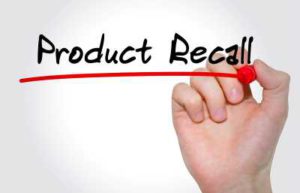 Most people know that when a product, food, or medication is recalled by a governmental entity such as the Food & Drug Administration (FDA) or the Consumer Product Safety Commission (CPSC), the recall should be taken seriously. If a government agency finds it necessary to order goods off the shelves and out of circulation or to mandate a repair or retrofitting, there must be a good reason.
Most people know that when a product, food, or medication is recalled by a governmental entity such as the Food & Drug Administration (FDA) or the Consumer Product Safety Commission (CPSC), the recall should be taken seriously. If a government agency finds it necessary to order goods off the shelves and out of circulation or to mandate a repair or retrofitting, there must be a good reason.
However, there is sometimes confusion surrounding a “voluntary recall.” The term may create the impression that the problem is less serious, and that the company has simply decided to recall products as a quality control measure. Some consumers even confuse the term “voluntary” with “optional,” assuming that they can safely make their own decisions about whether or not to use the product.
Voluntary recalls should be taken just as seriously as mandatory recalls.
What is a Voluntary Recall?
A voluntary recall often is a recall of a product by the manufacturer that occurs as the result of negotiations with the Consumer Product Safety Commission to get a suspected dangerous product off the shelves until further investigation can be completed.
Until 2010, all recalls of consumer products were technically voluntary, since the CPSC didn’t have the authority to order a mandatory recall. Today, both the FDA and the CPSC have the power to mandate a recall under certain circumstances, and a federal district court may also order a recall.
Still, most voluntary recalls come about the same way they always did. Although a company has the freedom and ability to issue a truly voluntary recall, on its initiative and without prompting from regulators, most come about as a result of negotiations with the appropriate government agency.
The government’s goal is to get the dangerous product out of the hands of the public as quickly and efficiently as possible, but the manufacturer’s goal is usually more complicated. Recalling products is expensive, but the revelation that the product is dangerous can be even more expensive. Announcing a voluntary recall allows the company to position itself as vigilant and prepared to do the right thing, mitigating the brand damage associated with the defect or contamination. Agreeing that the company will proceed “voluntarily” allows the government to achieve its safety aims more quickly and efficiently since the company has the incentive to cooperate.
Recent Voluntary Recalls
Voluntary recalls occur frequently and across a wide range of product types and companies. Below are just a few examples of recent voluntary recalls that illustrate the seriousness of the issues triggering a voluntary recall:
- EzriCare and Delsam Artificial Tears Recall
- Philips CPAP & BiPAP Recall
- Exactech Knee Implant Recall
- Paradise Grills Recall
- ZLINE Gas Range Recall
- Medtronic HeartWare Ventricular Assist Device Pump Implant Recall
- Dry Shampoos containing Benzene
Looking back a bit further, voluntary recalls have been associated with even more significant, higher-profile risks. Some examples include:
- The 2016 recall of Samsung’s Galaxy Note 7 when consumers began to report exploding batteries.
- The 2004 recall of Merck’s prescription drug Vioxx, which was ultimately responsible for the deaths of more than 60,000 people.
- The 2000 recall of millions of Firestone tires, after a tire failure, resulted in hundreds of deaths and injuries.
- The 1978 “voluntary” recall of 1.5 million Ford Pintos—after several deaths, civil lawsuits, and a criminal investigation regarding the tendency of the Pinto’s gas tank to explode in low-speed, rear-end collisions.
Liability After a Voluntary Recall
While a voluntary recall can limit the company’s liability from that point forward, it does not undo past wrongs. The Vioxx recall provides a clear illustration of this principle: though the recall was issued in 2004, tens of thousands of patients had already suffered serious harm or even death. In the years following the recall, tens of thousands of lawsuits were filed against the company, and settlements reached into the billions. Later, investors sued Merck, too, alleging that the company had not adequately advised them of the risk associated with Vioxx.
If you’ve been harmed by a defective product, whether or not it was the subject of a recall, it is in your best interest to consult with an experienced product liability attorney as soon as possible.

